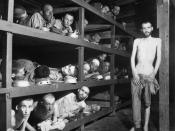Both 'One Day in the Life of Ivan Denisovich' by Alexander Solzhenitsyn and 'If This is a Man' by Primo Levi are books written about one of the most horrific features of the twentieth century - forced labour camps. Although the authors describe different types of camps with different regimes, their stories are very similar in one aspect. Both of them write about the degradation of the human soul as a result of the harsh conditions in the camp. However, despite cold, hunger, humiliating treatment, and omnipresent fear of death, some prisoners in both narratives, in particular the heroes of each, managed to maintain their humanity, largely through the formation of either genuine friendships or pragmatic alliances. Still, Häftlinge in the Nazi concentration camp are more devastated by the system than zeks in the Gulag camp, because, although all had to endure forced labour in both camps, the Gulag was established with the purpose of obtaining a free labour force, while the German concentration camps were death camps, from which there was meant to be no escape or return.
Knowledge of this fact led Häftlinge to give up on life and hope, and this often made them heartless towards others. Therefore, judging from Levi's and Solzhenitsyn's accounts, friendship in Auschwitz was a rarity, while in the Gulag amity was usual.
The human soul's inseparability from physical sufferings of the body can lead to the destruction of an individual's humanity. In both the Gulag camp described in 'One Day in the Life of Ivan Denisovich' and the Nazi Lager portrayed in 'If This is a Man' detainees undergo systematically cruel and brutal treatment. They suffer from hunger, lack of sleep, exposure, exhaustion, and above all, deprivation of human rights. Nevertheless, in the worst sufferings there could often...


